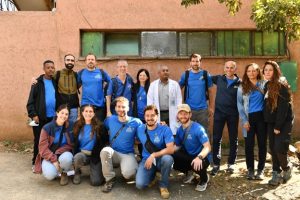
Africa has abundant and wide-ranging renewable energy sources. Wind, solar, and geothermal energy are but to mention a few. There is also a high demand by countries but due to lack of sufficient technology and finance countries are unable to bridge the gap between demand and supply. Linos Mopha works at African Climate Policy Center as Senior Environmental Officer under the Economic Commission of Africa.
As to him, there is a vast renewable energy source in Africa but the continent suffers from energy paradox. The resource potential is very high but the availability is very low.
To fill the gap, private investors have taken the initiative and governments show their willingness to cooperate with them. Currently, projects aiming at exploiting the resource in different countries are underway. The same is true here in Ethiopia. The projects also have set as a goal not only supplying energy but also mitigating climate change as per the Paris COP agreement.
Availing energy supplies requires infrastructural development such as roads, telephone lines and health facilities which were stipulated by The African Energy Initiative and ratified by member countries. It is also to be recalled that decades earlier Africa had begun a massive program for regional integration to support countries through fostering road and rail transportations. It has established a continental free trade area, which boost economic progress. Investing on linkage among countries lays the ground for massive energy exploration, proper exploitation and appropriate transmission for private sector as well as the public one. The availed resources can be used in the needed areas. In such a way the gap will be narrowed down.
Obviously, exploiting energy resource needs technology. Asked whether countries are required to import the technology, Lion said that, it is not about importing technology; currently, globally, the price of the renewable energy technology has so much. Over the last six years now the prices of solar panels have fallen by 80 percent and turbines by 70 percent and from time to time the price has continued to fall.
Other costs such as installation and full deployment of the technology depend on the respective countries. The transaction cost, the exchange rate of local currency against hard currencies, the time duration of investors getting license and other agreements might result in additional costs. But what matters most is that countries promote the technology in the local context and take the opportunities for technology transfer through imitating the design by their own skilled labor, job creation and value chaining.
On the other hand, based on the enabling environment created in the countries, foreign investors manufacture the equipment there. And such a practice, through time, strengthens local capacity.
Experience shows that, in many countries, private public partnership is not developed as it is required. Even in some countries instead of cooperation there is confrontation. In this regard complaints are raised by private companies. Hence, for successful accomplishment of projects governments should show their commitment.
As to Linos, to minimize the possible dispute between the two parties, the African energy summit signs up an up to date initiative. The private companies also sign it up.
There are three pillars of the initiative. The first one is sustainability that means the energy investment has to go to the system in which socially and environmentally sustainable.
There must be a reason for investment on the part of the private companies otherwise it will not succeed.
One of the ways via which countries could check the sustainable use of their national commitment to climate change mitigation is developing renewable energy dimension.
The second pillar which is very important is the governance pillar. It requires the countries put in place an enabling policy framework— the government’s system of leadership, transparency and translation of the action that has been reached on the African energy initiative and removal of bottlenecks that create obstacles to investment.
The private sectors entity is also required to live up to their commitment so that they would find themselves in the responsible manner without compromising the environment and the social wellbeing.
The United Nations energy pact also stipulates the strict follow up of responsibility in investment.
The third pillar is that once the countries develop the system of responsibility and assure their good governance then the finance inflow will keep on going.
Of course, renewable energy development is part of a mitigation strategy to climate change. It also serves for the implementation of adaptation program. As mentioned above, there is a huge potential on renewable energy development in Africa. Renewable energy does not only mitigate outdoor pollution but also in house gas emission.
It should be known that where the gas is emitted does not matter. The impacts are global because climate change knows no boundary. Therefore, any mitigation ambition of any country has value in global dimension in climate action.
With regard to replacing, carbon based energy by renewable one step by step Linos said that, the African energy initiative makes countries to be robust, resilient and reliable in terms of energy utilization. The more countries bring renewable energy to the table the more diversified will be their energy sources and the more they get energy mix and they will be the most secured and reliable.
When the cost of renewable energy gets down then countries prefer to use renewable energy than the carbon-based energy and overtime they will give up carbon energy. Similar to Ethiopia most developing countries rely on biomass energy particularly for cooking and lighting which in turn devastate the environment.
As to Linos when countries develop the renewable energy because of reduced price people prefer to purchase the renewable one. In so doing, step by step, they shy away from using biomass for household energy. And whenever the poor are provided solar panel and biogas in the remote rural areas, dependency on biomass also gets reduced in a bid that mitigation of global warming realized.
BY ABEBE WOLDE GIORGIS
The Ethiopian Herald Sunday Edition 24/2020





